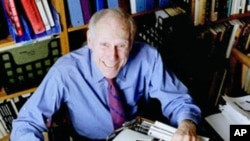Independent publisher and free-speech activist Barney Rosset, who defied U.S. obscenity laws to publish works by controversial authors like D.H. Lawrence, Henry Miller and William S. Burroughs, died at home in New York this week, just a few months short of his 90th birthday.
Rosset was born in Chicago, in 1922, to a well-to-do family. Raised and schooled in a progressive social environment, Rosset grew up an iconoclast, and something of a rebel. He attended four colleges before graduating.
In 1951, after serving in the U.S. Army during World War II, Rosset bought the tiny Grove Press, turning it into an alternative publishing house which welcomed non-mainstream writers.
In 1959, Grove Press released an unexpurgated edition of the D. H. Lawrence novel "Lady Chatterley's Lover." The book had been banned in Britain for its explicit sexual content. Grove’s U.S. edition sparked a fierce legal battle over the First Amendment right to free expression, which Rosset finally won in 1961.
Grove next published another banned work, "Tropic of Cancer," the semi-autobiographical novel by American expatriate writer Henry Miller. That legal battle went to the U.S. Supreme Court. In a landmark 1964 ruling, the justices ruled "Tropic of Cancer" was not obscene because of its "redeeming social value."
Rosset said literary merit was always his primary reason for publishing a book. But he conceded that he also relished the chance to assert the Constitution's guarantee of freedom of the press and freedom of speech.
"I feel that if people don't have the right to express themselves, first of all, they are not going to be happy, and secondly, they aren't going to develop the creative abilities they have, as scientists, as bankers, as anything," Rossett said in a 2009 interview with VOA.
According to Neil Ortenberg, co-director of a documentary about Rosset's life called "Obscene," Rosset's tenacity and his extraordinary eye for artistic talent made him one of the most important American publishers ever.
"Publishing has always been considered a gentlemanly thing. That was just not Barney. Barney was a street fighter," Ortenberg said. "Also, I don't think Barney purposely set out to transform the country. What angered Barney was the hypocrisy in America that came out of the 1950s, and he wanted to do whatever he could to bring that down, and he decided to pursue these fights to the bitter end."
Rosset himself traced his ability to fight hard against long odds back to his high school years.
"I was a cross-country runner. And I didn't get tired very easily," he said. "That was my whole thing; it was endurance. It was a similar kind of thing, actually [with publishing]. I believed in freedom of speech. It never entered my head to quit."
However controversial his legacy, Rosset ranks among America's most honored publishers. In 2008, the National Coalition Against Censorship recognized his efforts.
The National Book Foundation gave him its Literarian Award for outstanding service to American letters, calling him "a tenacious champion for writers who were struggling to be read in America."




